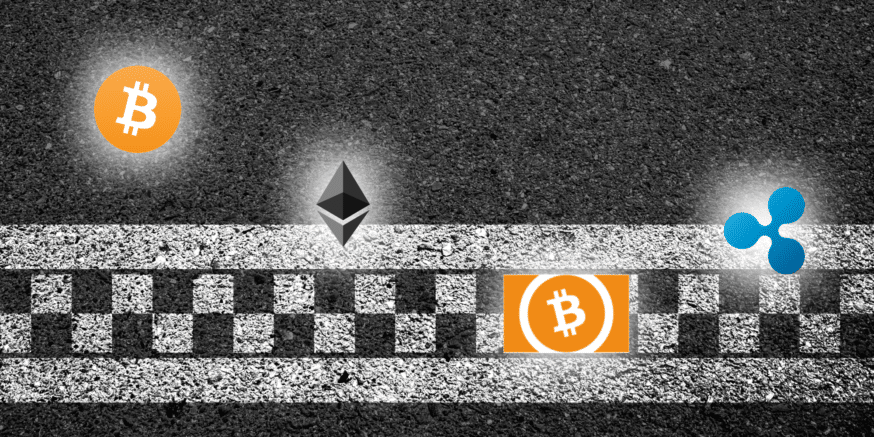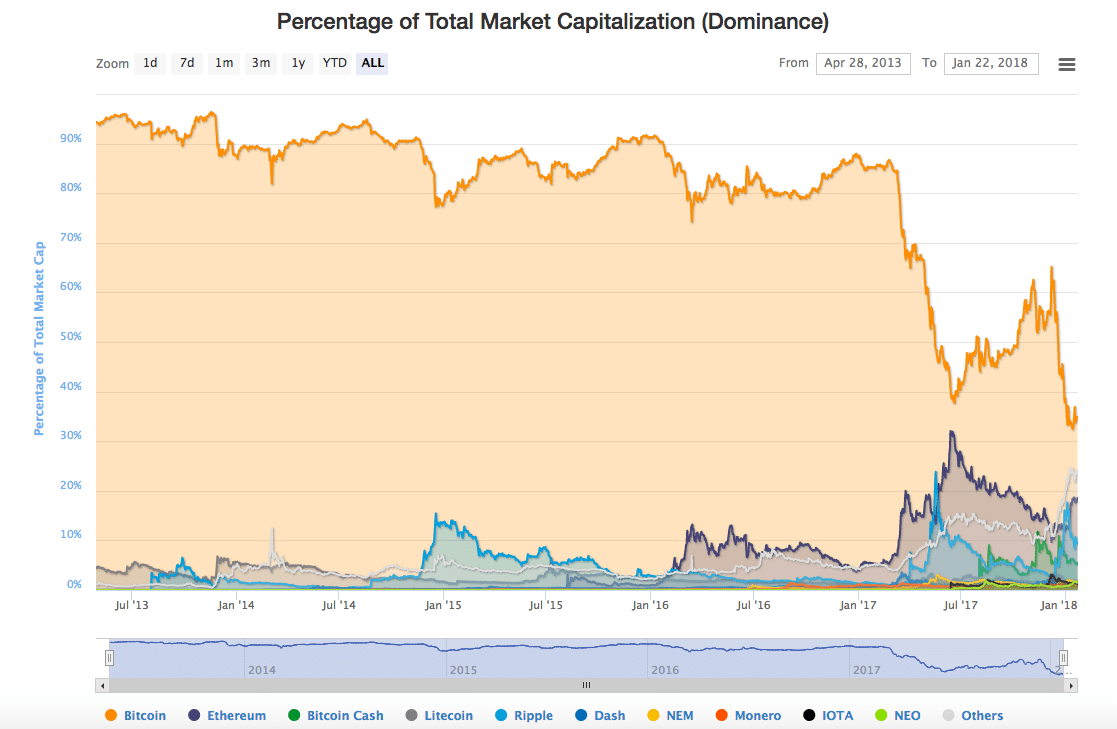To date, there are well over 1000 cryptocurrencies in the market attempting to change every industry from bananas to finance. However, a few coins have consistently been on top in a race to be named the world’s number one cryptocurrency.
In this article, we’re going to analyze some of the competitors and outline why they have the potential to be number one.
Bitcoin/Litecoin
Our first competitor is actually a pair of teammates. Bitcoin has long been the leading cryptocurrency, but trends have started showing that this may not be the case for long. At the time of this writing, Bitcoin dominance is at an all-time low – just 35% of the market. This is vastly lower than the 85% market dominance it had at this time last year.
Increased interest in altcoins and a split Bitcoin community are just a couple of the reasons behind a possible fall for the king crypto. Recently, high fees and slow transaction times have caused many crypto enthusiasts to look into other coins for their day-to-day use.
Litecoin with the assist. Although a fork of Bitcoin, creator Charlie Lee has stated that Litecoin works best as a transactional complement to Bitcoin’s use as a store of value. As Bitcoin implements the Lightning Network and the two coins become interchangeable through Atomic Swaps, it’s possible for Bitcoin’s scaling issues to be a thing of the past.
If the duo successfully implements these second layer solutions in a timely manner, it’ll be difficult for the other competitors to overcome the Bitcoin brand and first-mover advantage held by the current champion.
Pros
- Bitcoin has a proven track record. It’s survived numerous attacks over the years and has shown to be a secure blockchain solution.
- Bitcoin is the only cryptocurrency to a lot of people. Unless you’ve done some research, you’re probably not even aware that other options exist.
Cons
- The community controversy and constant hard forks are slowly chipping away at Bitcoin’s credibility.
- If the scaling solutions are ineffective or too slow to be implemented, people will continue jumping ship to other coins. More and more alternative coins are entering the limelight, and investors are realizing that there may be something better.
Bitcoin Cash
Bitcoin Cash is a fork of Bitcoin with a simple change – an increase in block size from 1MB to 8MB. Supporters argue that this scaling solution is closer to Satoshi Nakamoto’s true vision of Bitcoin. Larger blocks can hold more transactions which generally lead to lower fees and faster transaction times even as the network scales.
Currently sitting at #4 by market cap, there have been a couple times since the fork that it looked like Bitcoin Cash may overtake Bitcoin. The closest “flippening” attempt occurred in November 2017. At that time, Bitcoin Cash reached ~35% of the Bitcoin price on a few pieces of news:
- Cancelling the SegWit 2x fork
- Mining power shifting from Bitcoin to Bitcoin Cash
- More companies adding Bitcoin Cash support
If Bitcoin still has scaling issues even after the implementation of the Lightning Network, it could be likely that people switch over to next big coin with the Bitcoin name. By switching over, they get the battle-tested security of the Bitcoin network as well as the potentially low fees and fast transactions needed for everyday transactions.
Pros
- A lot of the technology that makes Bitcoin so great and secure is the same in Bitcoin Cash.
- Miner support is critical in maintaining network security. If Bitcoin Cash becomes substantially more profitable to mine, a shift in mining hashing power away from Bitcoin could be a major catalyst in the two currencies switching places.
Cons
- Larger block sizes tend to lead to more centralization around the large-scale mining farms that run the network.
- Some people view larger block sizes as a linear solution to an exponential problem. Bitcoin Cash may have to continuously increase the block size as the network grows.
Ethereum
Many people argue that Ethereum has the best shot at overtaking Bitcoin as the top market cap coin. Instead of daily transactions, Ethereum’s primary value is as a payment method to use the Ethereum network for functions such as smart contracts. Both Ethereum and Bitcoin can easily live in harmony.
Ethereum is currently the second largest coin comprising about 18% of the market. Several popular coins, called ERC20 tokens, are built using its network. Examples of these include OmiseGo, Augur, and FunFair.
There’s strong evidence to support an Ethereum market takeover. Currently, over 1 million transactions are taking place on the Ethereum network each day. That’s over 4 times the amount of Bitcoin transactions.
Also, Ethereum appears to have a much more unified community with a clear strategy to address scaling issues. Vitalik Buterin, the coin’s creator, has begun implementing solutions such as sharding and a shift to a Proof-of-Stake consensus algorithm to continue and improve Ethereum’s architecture.
Pros
- Ethereum has a community with strong leadership and an aligned vision. On top of that, the Ethereum Enterprise Alliance includes some heavy hitters with a vested interest in seeing the coin succeed.
- The network is already processing more transactions than Bitcoin, a lot more.
Cons
- Ethereum’s scaling solutions are still unproven for the most part. A surge in network traffic, as seen with CryptoKitties, still causes significant congestion.
- Smart contracts are tough to write securely. The DAO hack and Parity wallet bug prove that even if the Ethereum network is secure, the DApps built on top of it may not be.
Ripple
Ripple may be the most controversial coin in the crypto community. This coin is a favorite of banks and other financial institutions, but opponents argue that its centralized nature is the complete opposite of what cryptocurrency stands for. Whichever side you’re on, it’s clear that Ripple is still a solid contender in this race.
Early this January, Ripple rose astronomically in price to an all-time high of over $3.20 to briefly overtake Ethereum as the second largest coin. Continued announcements of partnerships with banks and companies like MoneyGram lead many to believe that Ripple could eventually end up on top.
Pros
- Ripple has the support of several major banks and is the preferred choice for the financial industry.
- Ripple transaction fees and times are substantially better than Bitcoin.
Cons
- Companies aren’t required to use the Ripple token (XRP) when using Ripple payment technology. The technology could grow in popularity without the token following suit.
- The Ripple company holds the majority of the XRP tokens. This puts an unproportionate amount of control into the hands of just a few people.
Conclusion
With Bitcoin dominance slipping, it’s entirely possible that by this time next year we may see a new face at the top of the market. The coins mentioned here are just a few of the currencies that could establish market dominance, though.
[thrive_leads id=’5219′]
Because the cryptocurrency market is still relatively young, an unknown coin today could easily be the next big thing tomorrow. With the pace the market is moving, it wouldn’t be a surprise to see a long-term champion that hasn’t even been created yet.
Never Miss Another Opportunity! Get hand selected news & info from our Crypto Experts so you can make educated, informed decisions that directly affect your crypto profits. Subscribe to CoinCentral free newsletter now.














